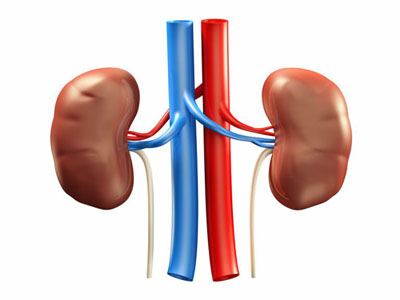Kidney
The kidneys are two bean-shaped organs located towards the back of body on either side of the spine near the waistline. They are about the size of a fist approximately 12cm long and weight around180gms. Other organs and two of the lower ribs protect them. Normal functioning kidneys serve the body in several very important ways. They Clean your blood and remove toxic waste products such as urea and creatinine. In case of kidney failure, the kidneys are no longer able to excrete the toxic waste products into the urine.
There are two types of kidney failure :
1). In acute kidney failure : which can occur because of a sudden trauma to the kidneys, the kidneys may stop working for a short while and then partially or fully recover.
1). Chronic renal failure : Is a progressive condition whereby the kidneys become irreversibly damaged over a long period, often many years. This condition can develop because of an infection, diabetes, hypertension, or inherited abnormalities. Advanced chronic renal failure is known as end stage renal disease (ESRD).A kidney transplant is a surgical procedure in which a healthy kidney from one person is placed into another (whose kidneys have stopped Functioning ).
The transplant kidney provides enough kidney function; remember some people are born with only one kidney and do not develop problems Any patient whose kidneys have permanently stopped Functioning is a potential candidate for a kidney transplant. However, many factors must 2 be considered in choosing between transplantation and chronic dialysis for a given individual. Among these factors are age, other medical problems, and personal considerations of work and lifestyle. You should discuss the options with your doctor and attempt to obtain as much information as possible in reaching your decision.

Sources of kidney Transplantation:
There are three sources of kidneys for transplantation: living related, living unrelated, and cadaver donors. "The Human Organ Act passed by the Govt. of India' states that legal donors are the members of recipient's family i.e. parents, brother, sister, children or spouse (husband/wife). Recipient's who do not have a legal donor need to get a clearance for their unrelated donor from an authorized committee of the hospital or the state."Living unrelated kidneys are kidneys from unrelated donors.Cadaver donor or non-living doners are the victims of brain death, usually the result of an accident or a stroke, through their own choice or their families.
The best results following transplantation are obtained with HLA-identical (6 antigen matched) living related donors, which almost always come from a sibling, rarely from a cadaver. We encourage living related donation whenever the family situation is appropriate, and, if circumstances permit donations from spouses. Transplantation is considered the treatment of choice for many patients suffering from diseases resulting in End Stage Organ Failure.




